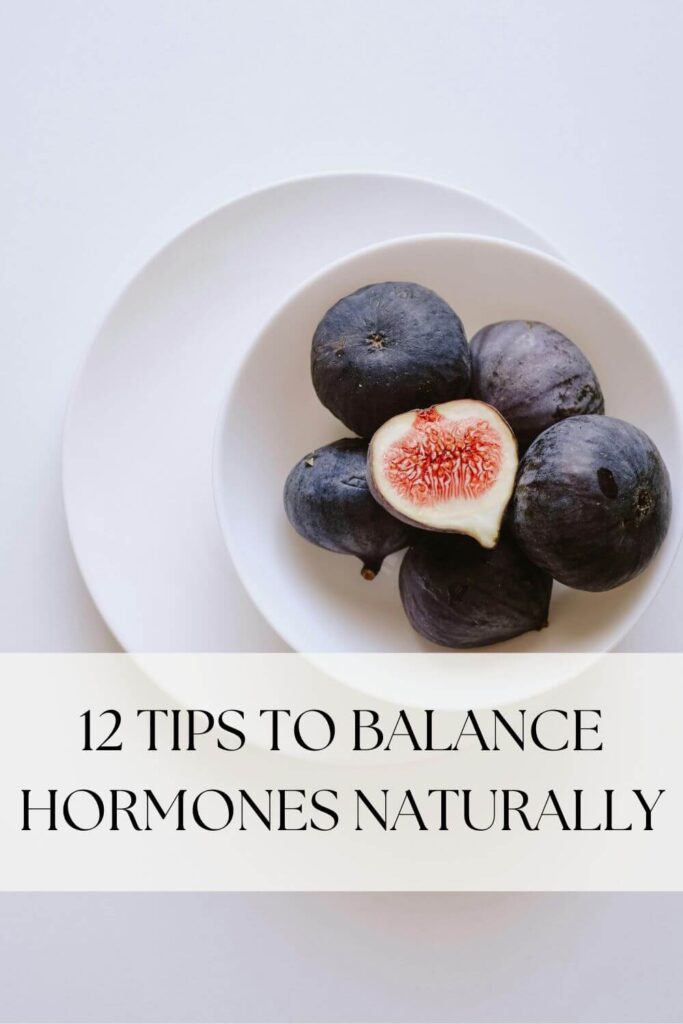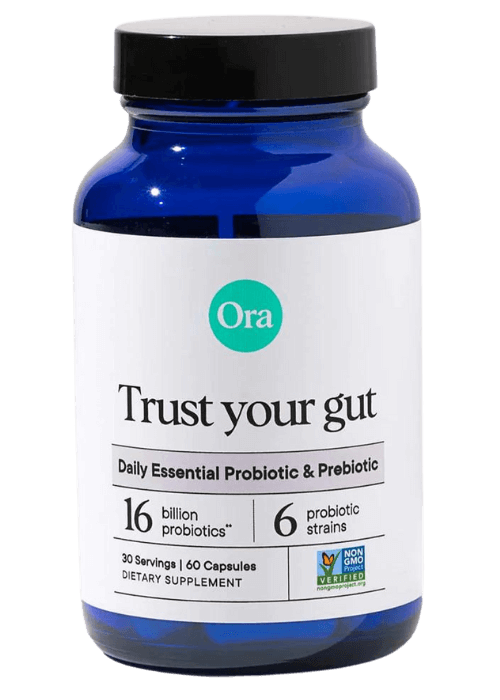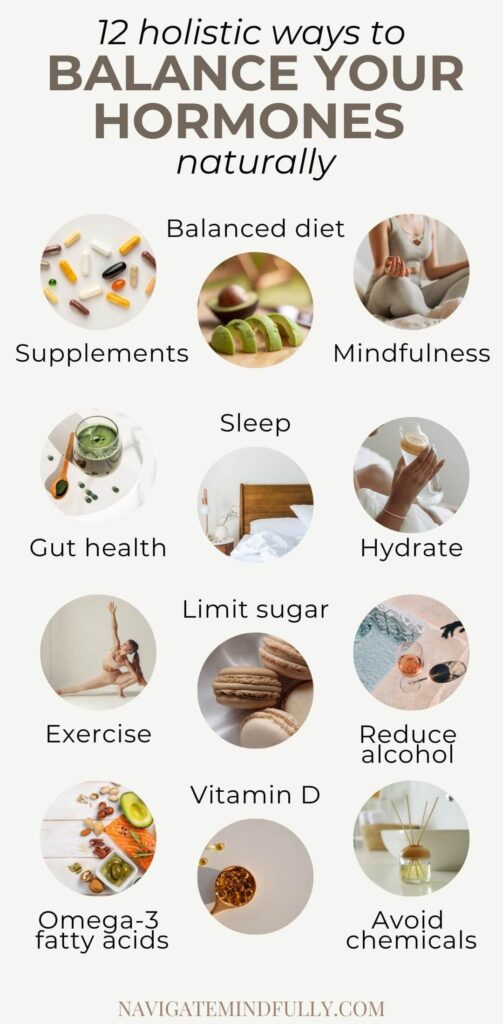12 Holistic Ways to Balance Your Hormones Naturally
Hormones play a critical role in regulating various bodily functions, including metabolism, growth and development, mood, and reproductive health. However, imbalances in hormone levels can lead to a range of health issues, from weight gain and acne to infertility and depression. Many natural remedies can help bring your hormones back into balance. In this blog post, we’ll explore some simple yet effective ways to balance your hormones naturally and improve your overall health and well-being.

12 Ways to Balance Your Hormones Naturally
Are you struggling with a hormonal imbalance? Many women experience issues with their hormones at some point in their lives, which can lead to a range of health problems. Luckily, there are natural remedies that can help bring your hormones back into balance.
1. Use Natural Herb Supplements
Natural herbs have been used for centuries to help balance hormones in the body. Many herbs contain compounds that can mimic or regulate the effects of hormones in the body, helping to promote hormonal balance. Natural herb supplements are a great way to support hormonal balance in the body. There are a variety of herbs that have been shown to have a positive impact on hormone levels, including:
- Maca root: This Peruvian herb has been used for centuries to balance hormones. It can be taken in supplement form or added to smoothies or baked goods. Maca root is particularly helpful for balancing estrogen levels.
- Ashwagandha: This herb is commonly used in Ayurvedic medicine to help reduce stress and anxiety. It has also been shown to have a positive impact on thyroid function, which can help balance hormone levels.
- Black cohosh: This herb is often used to address symptoms of menopause, such as hot flashes and mood swings. It may help balance estrogen levels and improve overall hormonal health.
- Red raspberry leaf: This herb is often used to support reproductive health in women. It is believed to help tone the uterus and balance hormone levels.
- Vitex (also known as chasteberry): This herb is commonly used to support menstrual health and regulate the menstrual cycle. It may also help balance hormone levels in women.
- Shatavari: This is a popular herb that is known to support reproductive health in women. It is believed to help tone the uterus and balance hormone levels, which can be particularly helpful during menstruation and menopause. This herb is also known to promote vitality and strength in women.

Hormonious
Hormonal Balance & Support
- Organic Adaptogen Capsules
- Hormonal Acne Relief
- More Stable Energy Levels
- Fewer PMS Symptoms
2. Eat a Balanced Diet with Plenty of Vegetables and Fiber
Eating a balanced diet is essential for maintaining good overall health, and it is particularly important for hormonal health. To keep your hormone levels in check, make sure to include a variety of vegetables in your diet, with a focus on cruciferous vegetables such as broccoli, cauliflower, and kale. These veggies contain compounds that can help balance estrogen levels.
In addition to vegetables, it’s also important to ensure that you’re getting enough fiber in your diet. Foods like whole grains, beans, fruits, and nuts can provide you with the fiber that you need to promote healthy digestion and elimination, which can help regulate your hormone levels.
3. Try Mindfulness for Stress Management
Stress can have a negative impact on hormone levels, so it’s important to find ways to manage stress on a daily basis. Meditation and mindfulness practices have been shown to lower stress levels and improve overall well-being. Try incorporating these practices into your daily routine, even if it’s just for a few minutes each day.
READ MORE: How to Create a Mindful Morning Routine: 8 Ideas to Start Your Day Mindfully
4. Get Enough Sleep
Sleep plays a vital role in regulating hormones in the body. Lack of sleep can cause an increase in stress hormones, which can lead to hormonal imbalances. Getting enough sleep helps to regulate hormone levels, especially cortisol, which is known as the stress hormone. It is recommended to get at least 7-9 hours of sleep per night to maintain hormonal balance.
5. Take Care of Your Gut Health
Taking care of your gut health is essential for your overall health and well-being. Incorporating probiotics into your diet can help improve digestion, boost immunity, and reduce the risk of various health issues. Probiotics are live bacteria and yeasts that are good for your health, especially your digestive system.

Trust your gut
Daily Essential Probiotic & Prebiotic
- Support Digestion
- Boost Immune System
- Great for Sensitive Stomachs
6. Drink Plenty of Water
Staying hydrated is crucial for maintaining hormonal balance. Dehydration can cause stress hormones to increase, which can lead to hormonal imbalances. Drinking plenty of water helps to flush out toxins and regulate the body’s temperature, which helps to keep hormonal levels in check.
7. Limit Sugar and Refined Carbohydrate Intake
Consuming too much sugar and refined carbohydrates can cause a spike in insulin levels which can lead to hormonal imbalances. Insulin is a hormone that regulates blood sugar levels and too much of it can disrupt the balance of other hormones in the body. Therefore, it is important to limit the intake of sugar and refined carbohydrates to maintain hormonal balance.
8. Exercise Regularly
Regular exercise is important for maintaining good physical and mental health. Yoga and Pilates are two of my absolute favorites that can help improve flexibility, strength, and balance, while also promoting relaxation and reducing stress. Both yoga and Pilates are low-impact, making them ideal for people of all ages and fitness levels. But the most important is to find an exercise that you truly enjoy, it makes working out completely different and you don’t feel like you have to push yourself.
9. Reduce Caffeine and Alcohol Intake
Consuming high amounts of caffeine and alcohol can have negative effects on your physical and mental health. It can cause sleeplessness, anxiety, dehydration, and other health issues. Therefore, it is very beneficial to limit the intake of caffeine and alcohol to maintain a healthy lifestyle.
10. Get Enough Omega-3 Fatty Acids
Omega-3 fatty acids are essential for maintaining good health, but our bodies cannot produce them on their own. Therefore, it’s important to get enough Omega-3 fatty acids from our food or supplements. Foods like salmon, nuts, and seeds are rich in Omega-3 fatty acids and can help reduce inflammation, improve brain function, and lower the risk of chronic diseases.
11. Get Enough Vitamin D
Vitamin D is a crucial nutrient that helps our bodies absorb calcium and maintain strong bones. It is primarily obtained through exposure to sunlight, but can also be obtained through supplements. It is important to get enough Vitamin D to prevent deficiencies and related health issues.
12. Avoid Household Products That Contain Endocrine-Disrupting Chemicals
Household products can contain chemicals that disrupt the endocrine system, for example, cleaning products, air fresheners, pesticides, and personal care products such as shampoo and lotion. It’s important to carefully read labels and choose products that are free of harmful chemicals like phthalates, parabens, and triclosan, and consider using natural alternatives like vinegar, baking soda, or essential oils for cleaning and freshening your home.
Keeping Hormones in Balance
Balancing your hormones naturally can take patience. Fortunately, there are many natural ways to balance your hormones. By making small changes to your lifestyle, such as getting regular exercise, reducing stress, and getting enough sleep, you can improve your hormonal balance and feel better overall.
It’s important to note that hormonal imbalances can be caused by a variety of factors, including genetics, underlying medical conditions, and medications. Therefore, it’s important to seek the advice of your healthcare provider to identify the root cause of your hormonal imbalances and develop a personalized plan for managing them.
But with a little effort and some healthy habits, you can improve your hormonal balance and feel your best!
Pin these tips as a reminder to take care of your hormonal health!

MORE POSTS YOU’LL LIKE:
10 Ayurvedic Self-Care Rituals for Overall Well-Being







